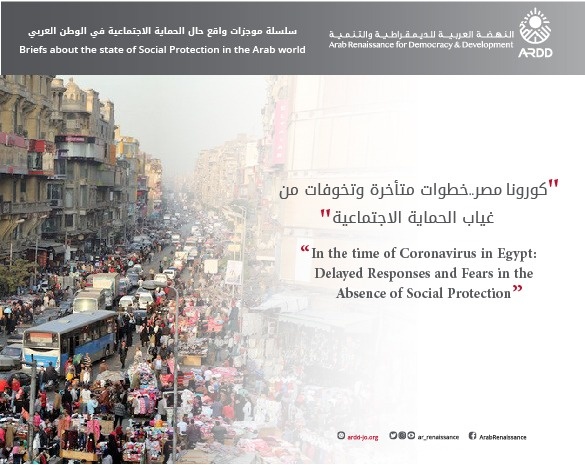In this brief, ARDD analyses the measures taken by Egypt to address the needs of those that are the most impacted by the Coronavirus pandemic; namely refugees, daily workers, women, children, and the elderly. ARDD urges Arab governments to implement emergency response plans in order to protect their people against the ramifications of this virus.
So far, Egypt has registered 1,450 official Coronavirus cases and related 94 deaths. Meanwhile, the authorities imposed a curfew on March 25, ordering the full closure of cafes, restaurants, clubs and all places of social gathering – ultimately leading to the workers in these places to lose the small amount income they used to make. With the virus spreading across Egypt, the Egyptian government has taken some measures such as imposing partial curfews to prevent gatherings and slow down the spread of the virus, but many people have criticized that the imposition of these measures was delayed.
The COVID-19 Pandemic has also revealed the poor capabilities in Egyptian heath facilities, especially after a team from the World Health Organization in Egypt recommended that the government take greater steps to identify people who were in contact with the infected cases and test them early.[1]
In its response to the issue of informal and irregular employment, Egypt has allocated a three-month EP500 grant to be distributed per month to support all irregular and informal workers impacted by the Coronavirus pandemic. In addition, the government has allowed impacted companies and establishments to pay administrative service fees on interest-free installments and has postponed the payment of social development contributions, for three months, without incurring any additional amounts or delay penalties. [2]
The announced numbers of laborers qualified to receive the grant amount to approximately 1.5 million USD. However, Egyptian authorities have started to distribute this grant only to workers registered at the Ministry of Labor, which amount to 120,000 workers, at the cost of EP60 million. The crisis of irregular employment is aggravated by the fact that the majority of these workers work in the informal economy, constituting between 40% and 80% of the total economy.[3]
The population in Egypt, the largest country in the Arab world demographically, is estimated to be 100 million people, one third of whom live on less than $1.5 a day according to the Central Agency for Mobilization and Statistics. Further the unemployment rate in Egypt exceeds 10%, and the number of workers in the informal sector is estimated at 5 million people who do not have any form of social protection.[4]
There have been community efforts to contribute to the response to COVID-19 in Egypt. To address the implications of the Coronavirus pandemic, some youth initiatives were launched in various governorates in Egypt to raise the awareness of citizens about the dangers of the Coronavirus. Also, some water companies in the governorates have launched a number of awareness campaigns about the dangers of the virus as well. Furthermore, the Egyptian and African Women Development Organization launched the “Stay at Home” awareness campaign that aims to cooperate with the Egyptian government in mobilizing the public mand urging people to stay at their homes.[5]
Civil society organizations in Egypt ahve launched the “civil society alliance to limit the spread of the Coronavirus” campaign, aiming at achieving social solidarity. This is done through addressing all stakeholders in order to coordinate and get information and logistical support for the initiative to work effectively and efficiently. In addition, it includes conducting frequent awareness sessions at the headquarters of partner civil society organizations at the governorate level. [6]
There have also been efforts to address the needs of specific communities in Egypt. In a significant step, the Egyptian Women Association undertook a number of preventive measures to protect the elderly from getting the Corona virus by putting them under medical supervision and follow up.[7] Also, with a variety of prevention and awareness messages, the Egyptian Advanced Society for Persons with Autism and Other Disabilities has initiated preventive and precautionary measures to stop the spread of the Coronavirus and protect people with mental disabilities and autism. It didn’t stop here: Egyptian civil society institutions have also rallied to educate people with disabilities through Facebook campaigns on ways to disinfect and sterilize their assisting tools such as the wheelchair and walking stick so they do not contract the virus or transmit it to a member of their family. [8]
With all measures taken there is still a need for further efforts to be exerted and more solidarity from the international community, state, private sector and the civil society to overcome this crisis.
[1] Corona Egypt: Ineffective Policies Due to Poor Capabilities
[2] Egypt “New Decisions” to Limit Corona’s Implications
[3] Corona aggravates the pain of Egyptians
[4] In Egypt, Corona Increases the Vulnerability of Day Employment
[5] Launching the “Stay at Home” Campaign
[6] Civil Society Organizations in the face of Corona
[7] “Egypt Women”: Preventive Measures to Protect the Elderly from Corona
[8] Campaigns to Protect People with Disabilities from the Corona Virus


